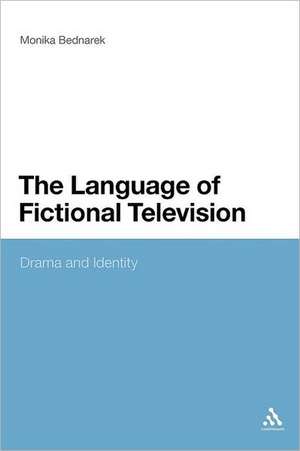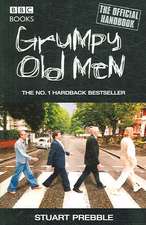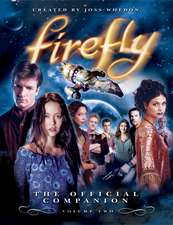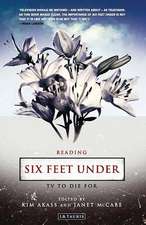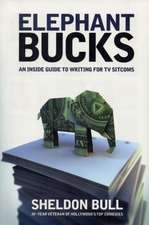The Language of Fictional Television: Drama and Identity
Autor Dr. Monika Bednareken Limba Engleză Paperback – 22 apr 2012
The first part focuses on communicative context, multimodality, genre, audience and scripted television dialogue while the second part focuses on televisual characterization, introducing and illustrating the novel concept of 'expressive character identity.'
Aside from the study of television dialogue, which informs it throughout, this book is a contribution to studying characterization, to narrative analysis and to corpus stylistics. With its combination of quantitative and qualitative analysis, the book represents a wealth of exploratory, innovative and challenging perspectives, and is a key contribution to the analysis of television dialogue and character identity. The volume will be of interest to researchers and students in linguistics, stylistics and media/television studies, as well as to corpus linguists and communication theorists. The book will be a useful resource for lecturers teaching at both undergraduate and postgraduate levels in media discourse and related areas.
| Toate formatele și edițiile | Preț | Express |
|---|---|---|
| Paperback (1) | 258.51 lei 6-8 săpt. | |
| Bloomsbury Publishing – 22 apr 2012 | 258.51 lei 6-8 săpt. | |
| Hardback (1) | 1008.43 lei 6-8 săpt. | |
| Bloomsbury Publishing – sep 2010 | 1008.43 lei 6-8 săpt. |
Preț: 258.51 lei
Preț vechi: 331.70 lei
-22% Nou
Puncte Express: 388
Preț estimativ în valută:
49.46€ • 51.79$ • 41.03£
49.46€ • 51.79$ • 41.03£
Carte tipărită la comandă
Livrare economică 10-24 aprilie
Preluare comenzi: 021 569.72.76
Specificații
ISBN-13: 9781441183668
ISBN-10: 1441183663
Pagini: 304
Ilustrații: 32
Dimensiuni: 156 x 234 x 16 mm
Greutate: 0.41 kg
Editura: Bloomsbury Publishing
Colecția Continuum
Locul publicării:London, United Kingdom
ISBN-10: 1441183663
Pagini: 304
Ilustrații: 32
Dimensiuni: 156 x 234 x 16 mm
Greutate: 0.41 kg
Editura: Bloomsbury Publishing
Colecția Continuum
Locul publicării:London, United Kingdom
Caracteristici
Looks at television dialogue using a variety of different methodologies, both quantitative and qualitative
Notă biografică
Monika Bednarek is Senior Lecturer in Linguistics at the University of Sydney, Australia.
Cuprins
1. IntroductionPart I: Fictional Television: Dialogue and Drama2. Analysing Television 3. The Genre of Dramedy and its Audience4. Television Dialogue Part II: Fictional Television: Character Identity 5. Dialogue and Character Identity 6. Expressive Character Identity and Emotive Interjections 7. The Multimodal Performance8. Expressive Character Identity and Ideology: Shared Attitudes 9. Conclusion References Indices
Recenzii
Bednarek's volume is a welcome corpus-assisted contribution to the study of television from which scholars and students of linguistics, media and cultural studies will much benefit. Informative, clear and subtle it is a very pleasant read for the corpus neophyte and for the corpus linguist alike.
Monika Bednarek's careful quantitative eye looks around unusual corners for a corpus linguist. Her book The Language of Fictional Television offers a distinctive, linguistic approach to analyzing popular culture, but draws productively on stylistics, cultural studies, media studies and sociological frameworks. This book provides a model for linguists who want to combine corpus evidence with 'big picture' questions, like how characterisation and identity works, and how ideologies are naturalized - and might be challenged - both in and out of fiction. The material can be adapted for teaching materials in senior undergraduate and postgraduate classes: for example, the chapter on how vegetarians and vegetarian foods are construed, and how this is involved in character development in the 'dramedy' Gilmore Girls, makes an excellent platform for teaching language and ideology.
Throughout the book, arguments are presented with great clarity and meticulous signposting... The Language of Fictional Television can be recommended to both students and researchers interested in television studies, and in the intersections between linguistics on the one hand and cultural, film and media on the other.
Monika Bednarek's careful quantitative eye looks around unusual corners for a corpus linguist. Her book The Language of Fictional Television offers a distinctive, linguistic approach to analyzing popular culture, but draws productively on stylistics, cultural studies, media studies and sociological frameworks. This book provides a model for linguists who want to combine corpus evidence with 'big picture' questions, like how characterisation and identity works, and how ideologies are naturalized - and might be challenged - both in and out of fiction. The material can be adapted for teaching materials in senior undergraduate and postgraduate classes: for example, the chapter on how vegetarians and vegetarian foods are construed, and how this is involved in character development in the 'dramedy' Gilmore Girls, makes an excellent platform for teaching language and ideology.
Throughout the book, arguments are presented with great clarity and meticulous signposting... The Language of Fictional Television can be recommended to both students and researchers interested in television studies, and in the intersections between linguistics on the one hand and cultural, film and media on the other.
